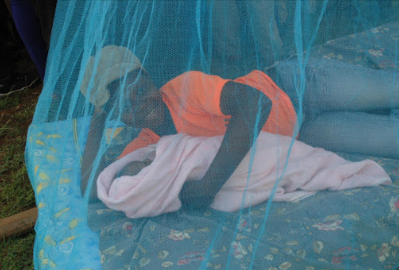The malaria vaccine’s high uptake in Kenya has not led to families ditching mosquito nets or other prevention tools, the World Health Organization, which backs the vaccine, has noted.
The WHO said the RTS,S vaccine has also not affected the uptake of other childhood vaccines or changed health-seeking behaviour.
Medics had feared some parents would ditch mosquito nets thinking the vaccine, which has only modest efficacy, is enough.
“Quantitative analysis shows that parents understand that malaria vaccine reduces the disease but does not prevent all cases, and continue to use other preventive and care-seeking measures,” WHO said in the recently released global health statistics.
At least 70 per cent of the eligible children in the targeted areas have received the first three doses of the vaccine in Kenya, but the uptake of the fourth dose is dismal.
“Malaria vaccine introduction resulted in a 13 per cent vaccine-attributable reduction in all-cause mortality (excluding injury) among children age-eligible for vaccination compared with children living in areas where the vaccine was not in use,” WHO said.
Africa bears the heaviest burden of malaria globally.
In 2022, the region accounted for 94 per cent of global malaria cases and 95 per cent of global malaria deaths, WHO said.
In Kenya, malaria kills about 10,000 people every year, mostly children, according to the Ministry of Health.
Children under the age of five are particularly vulnerable and in 2022, almost four in every five malaria deaths in the region were among these young children.
RTS,S was recommended by WHO in 2021 after successful pilot programmes in Ghana, Kenya and Malawi.
The figures are part of the World Health Statistics released last week by the WHO.
The figures also revealed that the Covid-19 pandemic reversed the trend of steady gain in life expectancy at birth and healthy life expectancy at birth.
The pandemic wiped out nearly a decade of progress in improving life expectancy within just two years. Between 2019 and 2021, global life expectancy dropped by 1.8 years to 71.4 years (back to the level of 2012). Similarly, global healthy life expectancy dropped by 1.5 years to 61.9 years in 2021 (back to the level of 2012).
The 2024 report also highlights how the effects have been felt unequally across the world.
The WHO regions for the Americas and South-East Asia were hit hardest, with life expectancy dropping by approximately three years and healthy life expectancy by 2.5 years between 2019 and 2021.
In contrast, the Western Pacific region was minimally affected during the first two years of the pandemic, with losses of less than 0.1 years in life expectancy and 0.2 years in healthy life expectancy.
“There continues to be major progress in global health, with billions of people who are enjoying better health, better access to services, and better protection from health emergencies,” said Dr Tedros Adhanom Ghebreyesus, WHO director general.
“But we must remember how fragile progress can be. In just two years, the Covid-19 pandemic erased a decade of gains in life expectancy. That’s why the new Pandemic Agreement is so important.”
Covid-19 rapidly emerged as a leading cause of death, ranking as the third highest cause of mortality globally in 2020 and the second in 2021. Nearly 13 million lives were lost during this period, including 5,000 Kenyans.
The estimates reveal that except in the African and Western Pacific regions, Covid-19 was among the top five causes of deaths, notably becoming the leading cause of death in the Americas for both years.
Despite setbacks caused by the pandemic, the world has made some progress towards achieving the Triple Billion targets and health-related indicators of the Sustainable Development Goals.
Since 2018, an additional 1.5 billion people achieved better health and well-being. Despite the gains, rising obesity, high tobacco use, and persistent air pollution hinder progress.
“While we have made progress towards the Triple Billion targets since 2018, a lot still needs be done. Data is WHO’s superpower. We need to use it better to deliver more impact in countries,” said Dr Samira Asma, WHO Assistant director general for Data, Analytics and Delivery for Impact. “Without accelerating progress, it is unlikely that any of the health SDGs will be met by 2030.”



